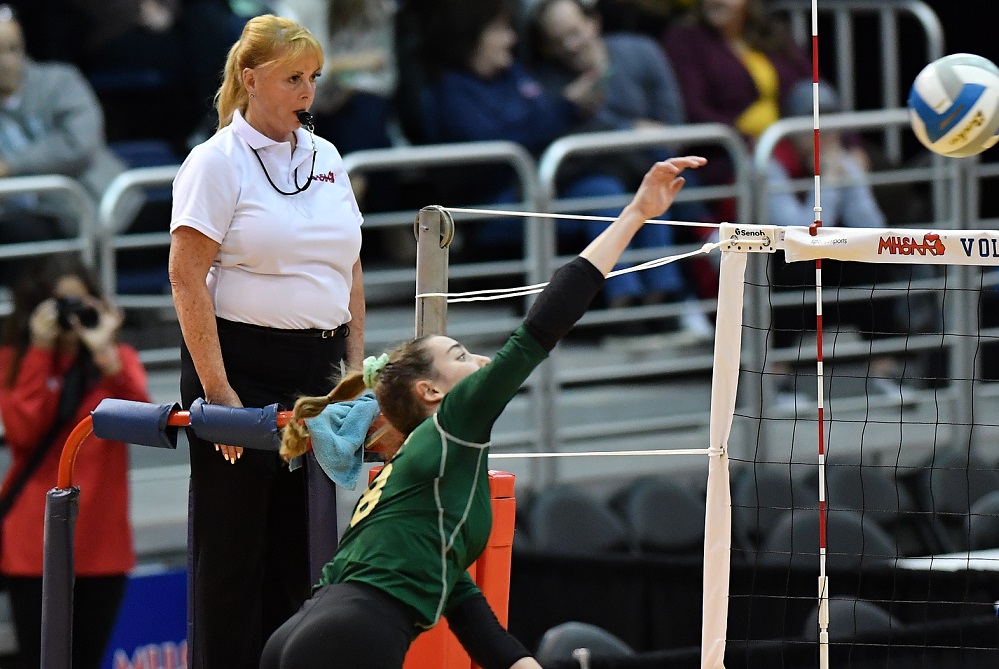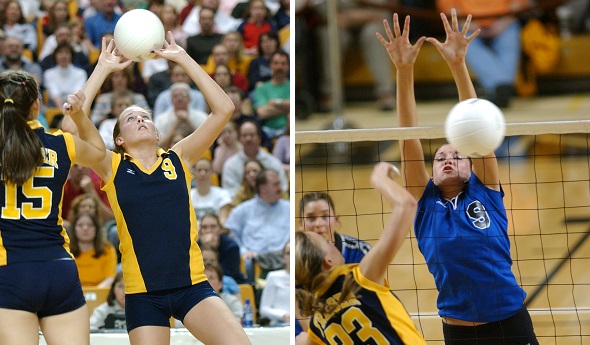
Be the Referee: Volleyball Obstruction
By
Brent Rice
MHSAA Assistant Director
September 23, 2021
Be The Referee is a series of short messages designed to help educate people on the rules of different sports, to help them better understand the art of officiating, and to recruit officials.
Below is this week's segment – Volleyball Obstruction - Listen
Ever wonder why in volleyball some balls hit into obstructions remain in play, while others are replayed, and some end the rally?
If a ball hits an obstruction over a playable area during a rally, and then is played by the same team, it has the same status as any other hit. However, that isn’t the case in all other instances.
If the ball hitting the wall or an object attached flush to the wall doesn’t actually interfere with a player’s legitimate effort to play the ball, the ball is dead and a loss of rally and point shall be awarded. If it does interfere with the playing of the ball, a replay is declared if the wall is less than six feet from the boundary.
If the ball hits a suspended backboard over the playable area, a replay will be declared as long as the referee believes the ball would have remained in play. Serves that hit any obstruction are a loss of rally and point.
Previous editions
Sept. 16: Catch or No Catch - Listen
Sept. 9: Intentional Grounding – Listen
Sept. 2: Pass Interference – Listen
Aug. 26: Protocols and Mechanics – Listen

#TBT: Miss Volleyball Winners Hold Court
October 5, 2017
By Geoff Kimmerly
Second Half editor
It was likely a coincidence that Grand Rapids Forest Hills Northern’s Linsey Taatjes and Fraser’s Angie McGinnis both wore jersey No. 9 as their teams met in the 2003 Class A Volleyball Final at Western Michigan University.
It hardly was a coincidence that both had led their teams to the final day of the season – Taatjes, a senior, was named that winter the state’s first Miss Volleyball Award winner; McGinnis, a junior, would be named Miss Volleyball in 2004.
In fact, the teams also had met in the 2002 Class A Final, won in three sets by Forest Hills Northern.
But the rematch would go to Fraser. Forest Hills Northern still ranks fourth in MHSAA history for winning 81 matches in 2003 but suffered its only loss in that championship decider, winning the first set 15-9 before falling 15-11, 15-4 over the last two. Taatjes had a team-high 14 kills, plus three blocks, four assists, seven digs and a pair of aces. McGinnis, meanwhile, had 36 assists, 11 kills and 10 digs as the Ramblers won their first MHSAA title in the sport. They would go on to sweep East Kentwood in the 2004 Class A Final as well.
Taatjes went on to play at Taylor University in Indiana, an NAIA school, and she was named Mid-Central Conference Player of the Year in 2004.
McGinnis went on to become a three-time All-America selection and two-time Southeastern Conference Player of the Year at Florida, finishing in 2007 as the program’s career leader in assists. She played in a number of events for the U.S. Women’s National Team and was an alternate for the 2008 Olympic team, and also played professionally overseas.
Click to visit the Michigan Interscholastic Volleyball Coaches Association website for this year’s Miss Volleyball Award candidates and all past winners. Among finalists this time is Rockford setter Hailey Delacher, whose father Kelly was Forest Hills Northern’s coach during Taatjes’ career.
PHOTOS: Angie McGinnis, left, set Fraser to the win in the 2003 Class A Final, while inaugural Miss Volleyball Linsey Taatjes put up a strong block and plenty of hitting for Grand Rapids Forest Hills Northern.

